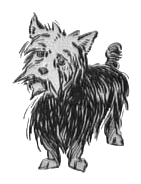 |
| Image: WikiImages |
The phrase "a perfect storm" has multiple uses but they all originate from the same basic meaning. The commonality is that any "perfect storm" is an event in which a rare combination of circumstances drastically aggravates the event.
The most literal use of the term is in weather forecasting. It refers to an unusually severe storm that results from a rare combination of meteorological phenomena. It is somewhat ironic since a perfect storm is often deadly and hardly "perfect" to those affected by it.
The phrase entered our vocabulary when a 1997 book, The Perfect Storm, and in 2000 a popular movie adaptation entered the mainstream.
Sebastian Junger planned to write a book about the 1991 Halloween Nor'easter storm which was technically an "extratropical cyclone." While researching for the book, Junger learned that the event was the confluence of three different weather-related phenomena which a meteorologist told him was the "perfect situation" to generate such a storm. Junger then coined the phrase perfect storm and use it as the title of his 1997 book.
Since the book and movie's release, the phrase has grown to mean any event where a situation is aggravated drastically by an exceptionally rare combination of circumstances.
Despite Junger coining the weather-related perfect storm, the Oxford English Dictionary has published references going back to 1718 for "perfect storm." The earliest citations use the phrase in the sense of "absolute" or "complete." For example, in Thackeray's novel Vanity Fair, he writes "in the midst of a perfect storm of sympathy.
There is even an 1850 meteorological use of the phrase describing "A perfect storm of thunder and lightning all over England."
Today, a "perfect storm" most often means a worst-case scenario, such as its use during the financial crisis of 2007–2008 to describe the terribly "perfect" combination of circumstances that allowed the crisis to occur.












